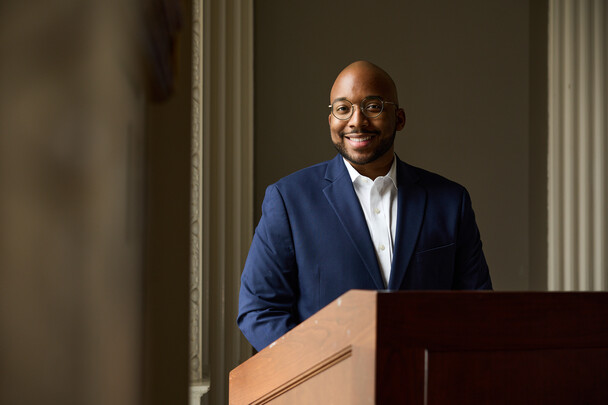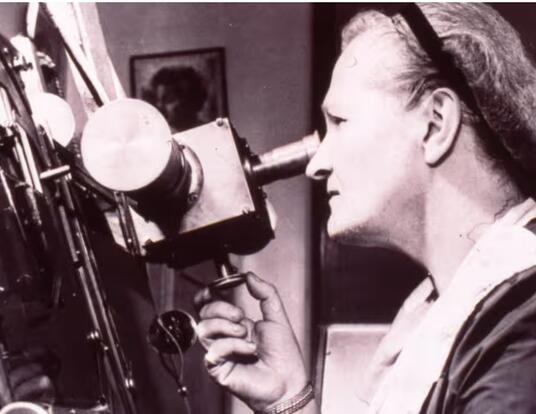The Costs of 'Twice as Good'
The downside of college prep school programs that target students of color

Research at Risk: Since World War II, universities have worked with the federal government to create an innovation ecosystem that has yielded life-changing progress. Now much of that work may be halted as funding is withdrawn. Find out more about the threats to medical, engineering, and scientific research, as well as how Harvard is fighting to preserve this work—and the University's core values.
When Garry Mitchell was 11, he transferred from a school attended entirely by Black students like him to one where the students were mostly white. After two years of wrangling with administrators, Mitchell’s parents were finally able to get their son into an honors math class. There, the young man worked hard and did well but could never seem to get a perfect score on a test, an achievement celebrated by the teacher reading the student’s name out to the class.
Finally, Mitchell broke the barrier. He scored 100 on an exam and waited proudly to hear his name announced along with those of his classmates who’d done the same.
He never did.
“I just recall that being an instance of me putting forth more effort than my classmates and still not getting the same recognition that they got,” he says. “[Working twice as hard] is something that I've since then abided by in formal and informal ways.”
Mitchell, a PhD student in education at Harvard’s Graduate School of Arts and Sciences (GSAS), says that his story is a small example of an old saying Black Americans know well: “You have to work twice as hard to go half as far.” In his 2023 Harvard Horizons project “Beyond Equality," he looks at how this aphorism plays out in college preparatory school programs (CPSPs) and finds unexplored ethical questions about the social and personal costs borne by the kids who participate in them.
When Only the Best Will Do
Mitchell says that the programs he studies actually institutionalize the mentality of “twice as good.” “It’s not enough to get Black and Brown students the modal educational opportunities,” he says. “The programs are based on the belief that the best track forward is to get them into elite schools, cement their career trajectories, and in that way balance out inequality in the long run.”
Several students and alumni in my study have talked about being called racist names or being provoked into fights. They felt like they just had to take it because their chances of being expelled would be really high.
–Garry Mitchell
Even with the support of CPSPs, Black and Brown students often have to put in more time and effort to access elite schools than their white counterparts who can afford tutoring and other academic resources. When they do reach Andover, Exeter, Choate, and other top prep schools, students of color are again held to a different standard. A child who violates a school’s code of conduct, for instance, might be suspended for a time if their family is a major donor or has gone to the institution for generations. Students on financial aid—particularly Black and Brown students—who commit similar violations might be expelled.
“Several students and alumni in my study have talked about being called racist names or being provoked into fights,” Mitchell says. “They felt like they just had to take it because their chances of being expelled would be really high. So again, you have to be twice as good in a behavioral way in order to make sure you don’t lose the opportunities you’ve worked so hard for.”

More than Half as Far?
Mitchell says his research shows that CPSPs do alter the life trajectories of most participants. They give students of color a leg up on the competition and send them farther than their peers—not only to elite prep schools but also top colleges and then successful careers. But the effects aren’t always durable. He cites social science research that shows that Black families in the US who attain a similar level of socioeconomic status as their white counterparts over time still experience downward or backward social mobility—particularly among their children. “To be on par is not enough,” Mitchell says. “You have to exceed that, especially when you account for the fact that, in our society, systematic racism works Black people, Black families, and Black individuals down from the status that they've attained.”
Moreover, Mitchell says there’s a high personal and social cost to relying on these vehicles of social mobility.
“One of the things I've noted in my research is that students who enter these journeys so early in their lives lose a lot,” Mitchell explains. “They forfeit their community connections and a sense of identity apart from who they are in majority white spaces. And that can be traumatic for them. The ethical costs of these programs are not always accounted for when we think about the net outcome.
It's important to think less about outcome and more about process, according to Harvard Graduate School of Education (HGSE) Assistant Professor Anthony Jack, PhD ’16, if we are to understand how everyday experiences shape the mental health and well-being of CPSP students of color.
“It is one thing to get into the college of one’s dreams,” says Jack, one of Mitchell’s dissertation advisors. “It is another to enter so damaged and alone that a student can’t take advantage of what it has to offer. If we care about students’ success, we can’t just focus on graduation and admit rates. Garry shows us how they don’t even tell half the story.”
One way that CPSPs can compensate for their ethical costs, Mitchell says, is to cultivate a strong sense of cohort among participants: group students by age and develop lasting connections between them so that they can share experiences and feel a sense of identity as they move into elite spaces.
“Some of the programs I study work strategically to build a sense of community among their students,” he says. “That thick sense of cohort can serve as a protective factor when students go off into majority white environments that leave them feeling disoriented and isolated.”
It is one thing to get into the college of one’s dreams. It is another to enter so damaged and alone that a student can’t take advantage of what it has to offer.
– Professor Anthony A. Jack, PhD ’16
Compelling Findings
HGSE Associate Professor Bianca J. Baldridge, another of Mitchell’s faculty advisors, says that his research is distinctive because it weaves together both sociology and philosophy. “Garry understands the philosophical claims about social justice and ‘need’ made by CPSPs, which, he argues, informs how these spaces are framed for low-income Black and Latine youth," she says. "Garry’s project is already generating compelling findings about the benefits, rewards, sacrifices, and challenges of participating in CPSPs.”
Mitchell says that he wants his research to bring to light the complications of CPSPs. By initiating a conversation about them, he hopes he can make educators and policymakers aware of the uncomfortable ethical questions that are intertwined with efforts to address inequality by catapulting students of color and marginalized people more broadly, into elite spaces.
“The goal of my project is to explore the underside of programs that are taken at face value as unequivocally good,” he says. “In that way, as we think about these various pathways to uplift or social justice, we can consider what some of the unintended consequences might be.”
Photo by David Salafia; Banner by Shutterstock
The 2023 Harvard Horizons Symposium will take place on Tuesday, April 11, 2023 at 5:00 p.m. in Sanders Theatre.
Get the Latest Updates
Join Our Newsletter
Subscribe to Colloquy Podcast
Simplecast





